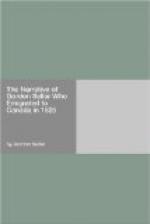which was a mere bridle-path. Up this they turned,
passing through solid bush. It was a bright,
hot day in the clearings, but under the trees it was
gloomy and chill, with a moist odor of vegetation which
was grateful to the master, and this was his first
experience of the bush. Fallen trees, which lay
across the track, their horses jumped, as they also
did on meeting wet gullies. Jabez said the path
had been brushed by an Englishman, rumored the son
of a lord, who had bought the block of land intending
to stay on it. That was the only improvement he
made. He came late in the Fall and society in
Toronto was more agreeable than felling trees.
He bet on horse-races that took place on the ice and
spent the evenings at cards. In the spring his
money was gone; had to sell his land to pay his debts,
and returned to England. On reaching the end of
the bridle-path the horses were hitched. Jabez
searched among the brush until he found a surveyor’s
stake. Placing a compass on top of it, he cut
with his jackknife three rods which he pointed.
He pushed two into the soil on either side of the
stake, and went ahead with the third. Posting
the master behind the first, he told him to keep the
three in range and to shout to him if he stepped on
either side. Producing from the bag behind his
saddle a hatchet, he went forward, cutting down the
brush where it blocked his straight course. When
some hundred yards away, he cried to the master to
come on, it was all right. On joining him Jabez
pointed to a scar made in the bark of a maple.
’That is the surveyor’s blaze, made five
years ago. I was in doubts where to find it,
for the weather has blackened it. We are all right
now, and will find another farther on.’
So they did, several more, though they were so faint
only the trained eye of Jabez could detect them.
As he came to each tree, he used the hatchet to make
a fresh blaze, while any branch that obstructed the
view between the blazed trees was lopped off.
Suddenly it grew lighter: they were again in the
sunshine and before them was a sheet of water.
It was too small to be called a lake; it was just
a pond, set in the heart of the woods. The master
was greatly taken with it and leaning over a log drank
heartily, for the water was clear and sweet, though
warm. ‘We may as well rest and take our
bite here,’ remarked Jabez, producing from the
pouch slung at his back some soldiers’ hard
tack, with thin sliced pork between instead of butter.
He explained it was hard to tell the quality of the
soil in the woods, and many were deceived, especially
as regards stones. The forest litter covers them,
and it is only when the plow is started that the settler
finds he has a lot that will give him many a tired
back in trying to get rid of the worst of them.
When you find big trees, maple or any other kind of
hard wood, it is a sure sign the soil is rich, but
if the trees are scrub or of soft wood it is certain
to be poor. Pine is not to be relied on as indicating




